Belgium brought civilization to Congo?
Researcher & Writer
Qi Gui
Location
Leuven, BE
Year
2020
How does Diasporic Tour Guides negotiate their hybrid identity with the colonial history in Africa Museum and generate new de-colonial knowledge?
After 10 years of restoration and renovation, the re-opening of the Royal Museum for Central Africa aroused controversy in 2018 worldwide. Designed as a colonialism show-off by King Leopold at the first stage, the RMFCA is facing a big challenge in the 21st century, “How to face the brutal legacy of Belgium’s colonial past and how to present a decolonized version of it?”. Director-General Guido Gryseels speaks: “The museum is trying to distance itself from its past without denying it”. And one attempt he’s proposing is “allow the people of Congo and Rwanda to speak in their own words”. As a result, more Diasporic tour guides are recruited in this new experimental time, but it seems every diasporic tour guide owns much agency and freedom to tell their stories to the visitors. And this new knowledge production process remain to be studies more.
My aim is to study the decolonization practices of diasporic tour guide, this research wishes to:
-
Explore the new mode of knowledge production process in contemporary museum by showing the interaction process between Official Tour Guides and Visitors.
-
Re-position Museum’s future public role and goals in contemporary time by exemplifying practices from RMFCA.
ROYAL MUSEUM FOR CENTRAL AFRICA
Tervuren, Belgium
Royal Museum for Central Africa originated as a ‘colonial palace’ of King Leopold II’s behest in 20th century. The museum was used as a propaganda tool for King Leopold’s Congo colonialism to win over the Belgian citizens. For decades African museum had been offered generations of Belgians their first brief introduction to Africa continent, which plays a significant role in producing knowledge & discourses over African history with Belgium or even Western.
Being there: During last semester, I have applied to be a regular volunteer in RMFCA. And I already known many people working there and some tour guides. So it would easier for me to get into the field.


CELINE
MY RESEARCH GATEKEEPER
The first time I met Celine [i]is in late 2019. She is the tour guide of my first visit in Royal museum of Central Africa. At the first sight, you could easily tell this middle-aged black woman grows up in a multicultural world by looking at her dress style. The exquisite and sophisticated purple turban with printed pattern reveals her African background, however, her black one-piece dress with two large round earrings indicate a French style of it. “Are you all from the English Group today?” she talked to us, a group consisted of different nations but all curious about Congo’s history. It seems our curiosity was captured by her immaterially. She first introduced herself to our group (that her whole family was from Congo) and explained all exhibitions’ stories during next two hours’ walk tour, which I enjoyed so much. Not only do I find the exhibitions interesting, as an anthropologist, I am more excited about Celine’s narrative.
[i] The name is changed due to anonymity, but the characteristic and story is true.
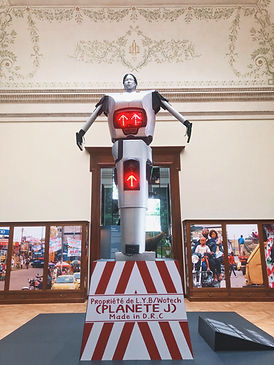

Cosmopolitanism
Cosmopolitanism was coined in academic field to describe an absence of ‘belonging’, especially for those second-generation migrants, who always get confused by their hybrid identity. Celine is one of them.
Celine used to be an actress before her tour guide job. Due to her French background, she was a guest actress in many low-cost French films during her youth. Pursuing for art, the unstable life for Celine lasted for several years, even she’s no longer an actress anymore, she’d still keep the star style and put fragrance frequently. It was not an accident that she entered the museum industry, not only for her survival, but also to figure out the questions inside her for many years.
Celine is optimistic towards present.
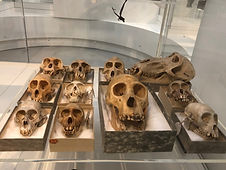
As a Belgian citizen, but also an African from Congo, She gets trapped in this identity problem and still doesn’t really find a way out. And that’s the pleasure part for being a tour guide to hear what others say and think. In the tour, she would stop at every controversial object, to ask “How do you think about this?”. For instance, the first time we stopped at one painting that portrays a tug of war between ‘white’ Belgians and ‘black’ diasporic Belgians, debating whether discriminated exhibits, related to colonial history, should be moved out of the museum. One of participants express his sadness and apology for what has been done to Congo in history. She replied with smile, “It’s all past and we should look forward…Now please keep in mind human are the same.”
Celine is optimistic towards present.
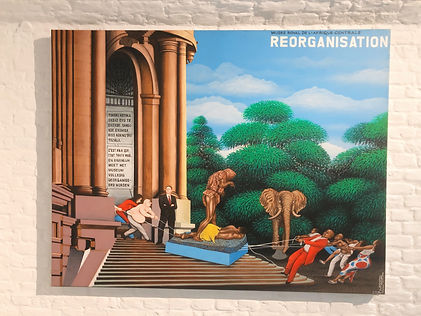
Celine is proud towards African history.
However, she never forgot her Congo-root pride. I can see her joy, excitement and happiness when she introduces the giant boat, traditional masks and the Kinshasa’ newly transportation technology, etc. “We” is the most frequently words she use to tell stories. “Congo is one of the countries in the planet speaks tonal language, I heard you’re doing the same as us in China? Qi”. After some seconds’ hesitation, I nod my head without realizing her hybrid identity expression in detail.
In her deepest mind, those exhibits are not something primitive or savage, they have their ‘modernity’ and ‘beauty’, don’t need to be judged by others.
Celine is proud towards history.
Celine is confident towards the future.
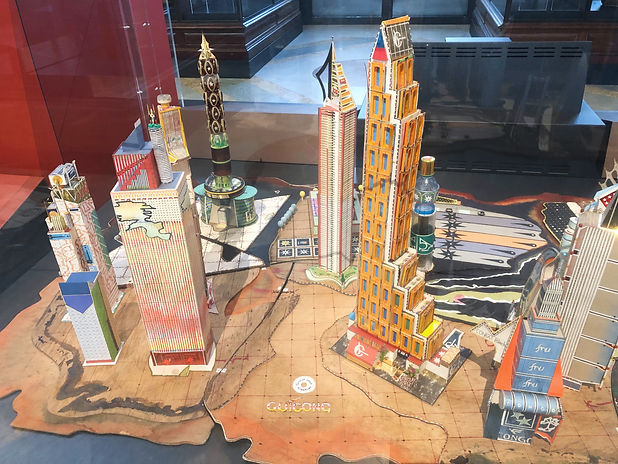
Future
Beside adult guide-tour, Celine is mainly responsible for Children’s education tour. When asked the difference, she said “I like showing kids what happened and share my experience, they are the future.” But do you know exactly how would this colonial history be like in future? I asked. “I don’t know, but I’m happy to see those kids from different ethnic background getting along so well now” and later Celine gives another her label smile.
Celine is confident towards the future.
DECOLONIZATION
Middle-age Crisis of
'Belgium bring civilization to Congo'
Welcome to my life story. It’s a story about my middle age crisis about identity. It’s not a long story, only 100 years, but turbulent. I have witnessed and changed a lot, People come and go but I am always there, at my home, Royal museum for Central Africa. I will first introduce myself, then my changing neighbors, some of them are nice but some are ewww, lastly, the scariest part, humans! They caused my identity crisis!
My name is “Belgium brings civilization to Congo”, I was born in early 20th century. Since then I have been lived in this giant hall of RMFCA for 100 years. If you ask me what a statue like me can do? I will tell you: a lot! For a hundred year, I was most of people’s pride source, I tell them what happened in Congo history, and most important, I look really good in this royal museum built by Leopold II.
As an old man, sometimes I would recall the old days that I was staying in the giant hall with my African statue brothers, we were all born in 1920s, even though I was born in gold but that never affect our relationship. We collaborated each other, I would show glory and pride to the world and my African statue brothers always act as ‘Savage’ to support me and prove I was right. That’s why I appreciated them so much, they never stab you in the back! They were so different but ‘authentic’, my best brother was always standing at the corner, dressing naked like a primitive, and someone told me he’s suffering from slavery? Oh poor, they are the real living proof that ‘Belgium brought civilization to Congo’. But late in 2018, they all moved to a dark room at entrance, and I got a new neighbor, he’s so strange and annoying! His father is Aime Mpane, a Congolese Belgian artist. I don’t know why he sent his son here but I really hate it, his son always communicates with human-visitors in a strange way and then people look at me differently. He never supports me and makes me feel bad all the time. Now I get to say, I have an identity problem in my late life. I even heard some human saying I should be kicked out from my home. Is me the real problem?
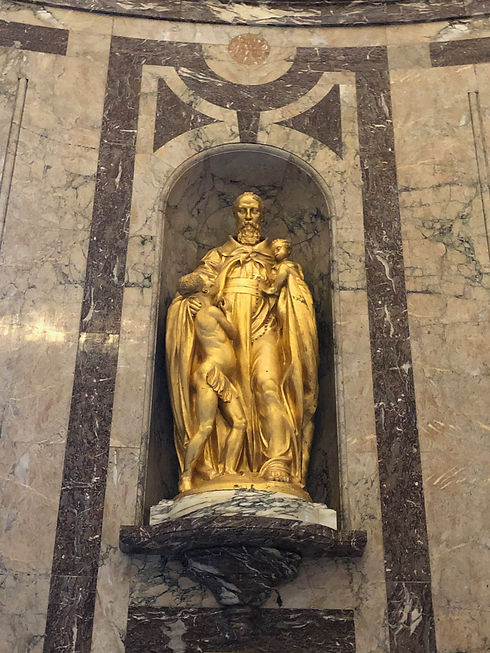

I hate my new neighbor

Let me look back at the human I met in my life. When I was young, I remember it’s all Belgian or other white people came to see me with pleasure and smile. They loved me, praising me as a civilization symbol and I was proud of it.
Through Time, more African people came, they seem confused and puzzled. They talked, discussed or even fought. I can’t tell the reason but I noticed human’s attitude changed. Nevertheless, I still held my civilizing identity until now.
Lately people come as groups, always led by a diasporic tour guide, they talk gossip about my relationship with my neighbor, and they would show sad face towards me. I don’t get it because I never change, I was the glory in the past but now I turn to a sad and shame symbol? How?
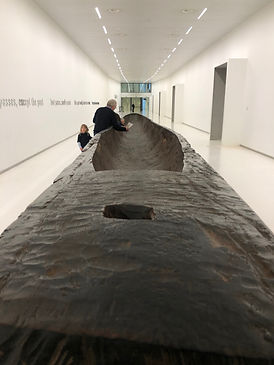
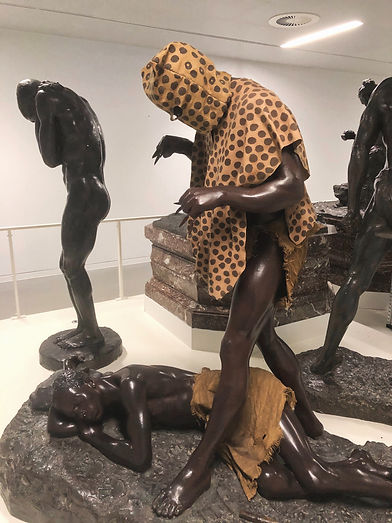
INTERVIEW
Non-fictional writing by Qi Gui.
In today’s interview, I am delighted to have ‘Belgium brought civilization to Congo’ as my interviewee to talk about his life history. His past colonial pride, the break-up with his best friends, his new neighbor, and human’s changing attitude.
(Interview Begins)
Q: Hi, ‘Belgium brought civilization to Congo’. Welcome to our series of De-colonialization of museums, our program aims to show our audience how exhibitions associated with the colonial past deal with their identity crisis in the 20thcentury. It’s our honor to have you as our guest. Could you please briefly introduce yourself to our readers?
A: Yes, of course. Hello, everyone. My name is ‘Belgium brought civilization to Congo’. My father is King Leopold II, whom you must hear about before. He’s very generous people because he named me ‘Belgium brought’ rather than ‘He did’. Born in the early 20th century, I am 100 years old now. For most of my time, I served as a glory symbol for Belgians, showing the gratitude of Congolese for bringing our culture and technology to Africa. That’s why I’m painted in gold because we were rich in history….Haha that’s a joke, but partially true. Generally, I used to tell people what happened in Congo history and how grateful they are for our help. However, now my life has changed totally, but that’s another story.
Q: Thanks for your introduction. You mentioned you used to serve as a pride source for Belgium colonial history. Can you tell us more about your work environment? How does it enable you to do so?
A: Yes, I was born in the 1920s at the Royal Museum for Central Africa, Tervuren… I still recall the old days that I’m supported by my brothers. I wouldn’t be successful and cherished by the public that much without them. We are born in the same era around the 1920s and owned our reputation by ourselves. I represented as the bright part of the new Congo since Belgians went there. And they are on the ‘Native’ side, standing there naked and doing something primitive and weird. Even though the huge status gap exists between us, my brothers always support my back by acting like a savage. Otherwise, nobody would believe what I am trying to prove, ‘Belgium brought civilization to Congo’. Their acting is so good that we fabricated a mysterious authenticity that people believed for more than one century. You can tell we were the best work partners till recently.
Q: Can you explain what happened to you and your brothers?
A: A sad story. We’ve been through a great transformation during the last decade. In late 2018, they all moved to a dark room near the entrance. I heard some gossip that they found mangy new brothers alike them there and already started a new life because humans no longer consider them as ‘Savage’ but as prestigious objects. I miss them. Do you know what is worse? I got a new neighbor last year and she is so annoying. She doesn’t cooperate with me as my brothers do. I can feel my glamour fading away.
Q: Do you mean your new neighbor’s uncooperative attitude changed your daily life?
A: It sure did! I would say she caused my middle-age identity crisis. She even said I’m too selfish and arrogant to notice that my brothers were suffering from slavery. And her father is Aime Mpane, a Belgian Congolese! Shouldn’t she be grateful that we brought civilization to Congo so that she would be born? How can she always communicate strangely with visitors? She must be bullshitting about me and that’s why humans treat me differently!!! I bet if my father King Leopold II knows it, he would be so pissed off! Now I even feel guilty for my existence at midnight L
Q: Does that mean humans also contribute to your identity crisis?
A: Yes, visitors today are different. I heard from some visitors said it’s called globalization? It’s a process that we are all intensively integrated into global flows. When I was young, it was all Belgian or other white people who came to see me with a big smile and pride. Later, visitors would include more Africans, they seem puzzled and confused. They talked, discussed, or even fought. I knew something changed. And now visitors come here more frequently as a group, led by a diasporic tour guide, they gossip my life and show sad face towards me. I used to be a glory symbol, how could I become a shame symbol through one night? Am I the real problem?
Q: That’s tough! Do you want to take back your discourse power?
A: I used to think about that. But I’m an old man, I’ve seen human and things come and go in one hundred years. Now I am more mature, maybe it’s time for others to speak, Not just for Belgians, but also people come from the world, to speak their truth. Therefore, I am ready to find my new role in globalization & decolonization time rather than fight for my voice back.
Q: It’s nice to hear that, I hope one day you can figure out your position as you said. Thanks for your participation, Have a nice day!

